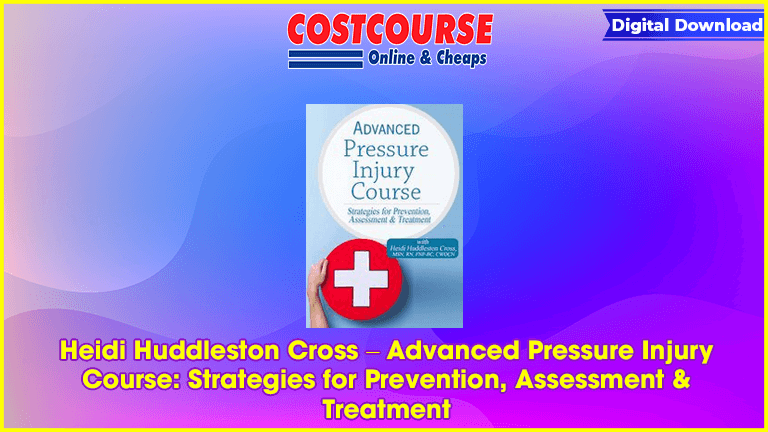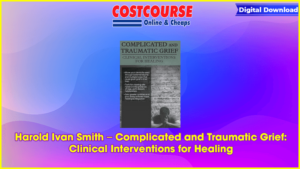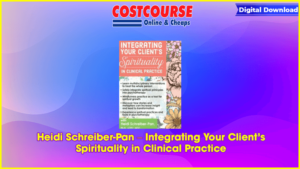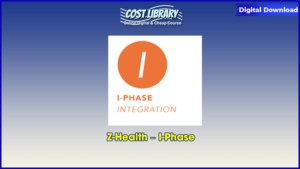Description
Pressure injury prevention, assessment and treatment. This is such complex and specialized care to provide to patients. There are co-morbidities to consider, rising costs, ever changing regulations and increased scrutiny.
Heidi Huddleston Cross – Advanced Pressure Injury Course: Strategies for Prevention, Assessment & Treatment
Do you feel confident you are up-to-date on the latest evidence that should be guiding your pressure injury decision making?
Prevention
As a frontline health care provider, you play a critical role in preventing pressure injuries from ever occurring – or not developing again. This course will provide you with the most need-to-know knowledge to effectively achieve your goals in a cost effective and evidence-based manner. Discussion will focus on the best in pressure injury prevention, including: risk factor reduction, standards of care, root cause analysis, support surface options, nutritional factors and repositioning frequency.
Assessment
Once a pressure injury develops, it is critical that it is promptly identified and assessed so proper treatment can begin. Rest assured….you will get everything you need to know when it comes to pressure injury staging, recognition of wound infection, avoidable vs. unavoidable wounds and the ability to differentiate pressure injuries from moisture associated skin breakdown.
Treatment
Once a pressure injury has been thoroughly assessed, the appropriate treatment plan needs to be implemented as quickly as possible to avoid deterioration and complications. You will take away the best knowledge and insights in pressure injury treatment, to include: wound bed preparation, debridement options, the newest product selection options hitting the market, cost-effective considerations, and when antimicrobial dressings should be used.
In addition to all the clinical insights to be gained, valuable documentation tips will be shared so that going forward you appropriately reflect your practice, protect your license, and avoid legal risks. You are guaranteed to increase your confidence, effectiveness, and career opportunities with this course recording on Pressure Ulcers.
Handouts
Manual (3.2 MB) 153 Pages Available after Purchase
Outline
Pressure Injury Prevention
Evidence Based Guidelines
National Pressure Ulcer Advisory Panel
Wound, Ostomy, and Continence Nurses Society
The Etiology of Pressure Injuries
Mechanical load: Magnitude and time
Mechanisms that lead to tissue damage
Risk Factors and Risk Assessment
Assessing risk using the Braden Scale correctly
Intrinsic and extrinsic risk factors – you need to know
Skin and tissue assessment
Practice Tips for Prevention
Skin care: Moisturization is key
Repositioning frequency: Is it really every 2 hours?
Get those heels up!
The RIGHT surface at the RIGHT time
The Role of Nutrition in Pressure Injury Development
Lab values
Avoiding unintentional weight loss
Pressure Injury Assessment
Wound Assessment
Look at the whole patient, not just the hole in your patient
Necessary elements of wound assessments
Decisions, decisions: Is it incontinence associated dermatitis or a pressure ulcer?
Pressure Injury Staging
Deep tissue injury and medical device related injuries
Controversies
STAGING QUIZ!!!
Wound Infection and Complications
The emerging role of biofilms
NERDS and STONEES – huh?
Sepsis
Osteomyelitis
Malignancy
Recurrence
Avoidable vs. Unavoidable Injuries
Skin failure
Kennedy Terminal Ulcers
Skin Changes at Life’s End (SCALE)
F-Tag 314
WOCN document
Antibiotic therapy
Pressure Injury Treatment
Wound Bed Preparation
The principle of TIME
Importance of cleansing
Debridement: What works, when and how
Basic Wound Dressings
The importance of moist wound healing
What needs to be on every formular
Vendor support and caveats
Advanced Wound Dressings and Therapies
When do we need to step it up and to what?
Antimicrobial dressings
There are so many……how to choose
Silver
Honey
Hydrofera Blue
PHMB
Iodosorb
Dakin’s Solution and vinegar (yes, we still use it)
Hypochlorous Acid
Sorbact
Collagen dressings
Negative pressure wound therapy
Other modalities
Surgical Repair
Skin grafts vs. flaps
Documentation Tips
What you need to know and what MUST be in the record
Examples of good documentation
Tips to keep yourself out of court








